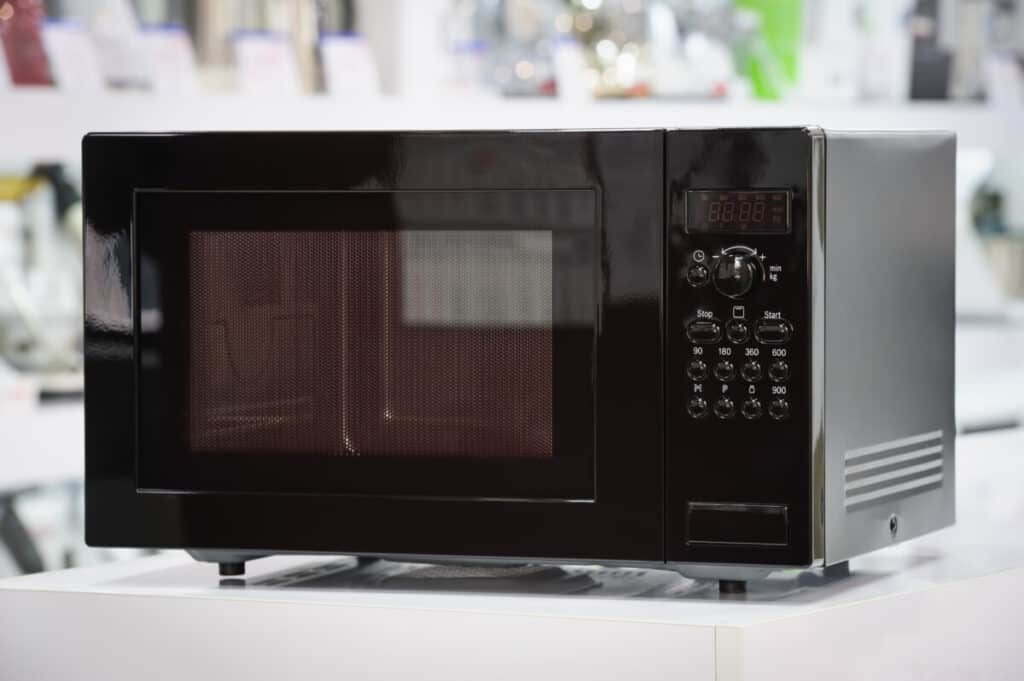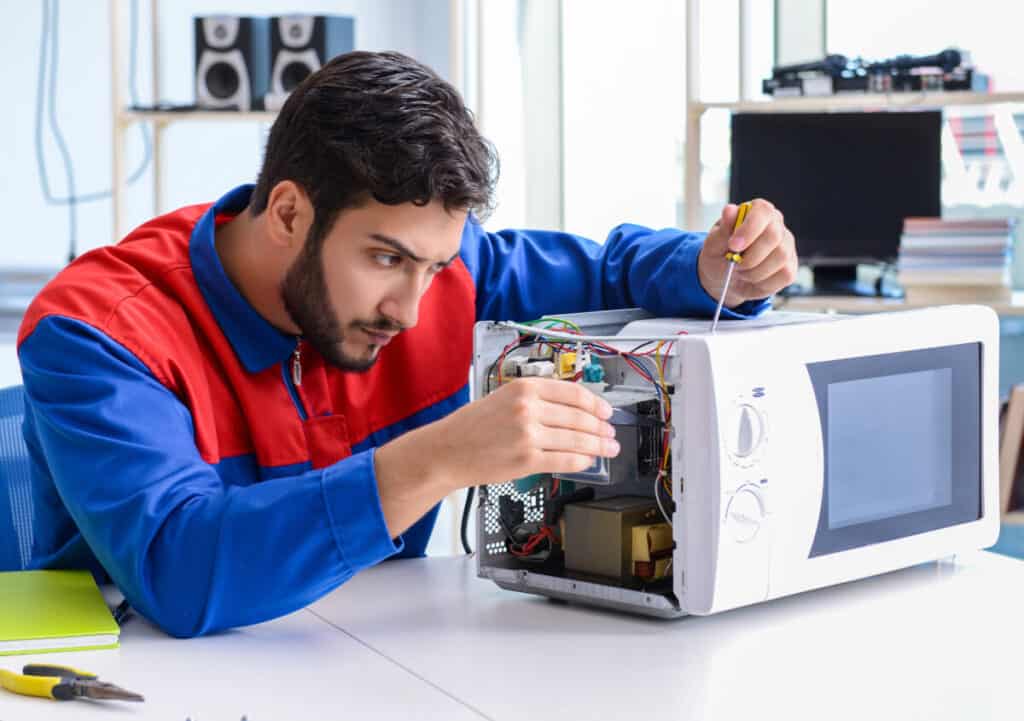
Since its invention in 1967, almost every home in America has adopted the use of a microwave. You may have just one microwave or even 2, but you want to get rid of a microwave. What is the best way to do so?
The best options for recycling a microwave include taking it to an electronic recycling center or appliance recycling center, selling it, or donating it. Don’t place a microwave in the trash or a landfill, as it’s hazardous to the environment. Be careful with the cord when moving it.
Want a better direction of where to look to get rid of your old microwave? Keep reading to find some good suggestions.
How to Recycle Your Microwave with Your Disposal Company
The first option, and arguably the easiest, is to throw it out or try and recycle it with the rest of a household’s trash. This may be feasible, but in some states, it is illegal to try and toss old electronics. Here is a table of which states allow microwaves to be thrown out with the rest of the trash and which do not. (source)
| States | Can Microwaves Be Thrown in the Trash Legally |
| Alabama | Yes |
| Alaska | Yes |
| Arizona | Yes |
| Arkansas | Yes |
| California | No: it is considered white goods or appliances and illegal to throw away |
| Colorado | Yes |
| Connecticut | Yes |
| Delaware | Yes |
| District of Columbia | Yes |
| Florida | No: white goods/appliances are illegal to throw away |
| Georgia | Yes |
| Hawaii | Yes |
| Idaho | Yes |
| Illinois | Depends: white goods/appliances with mercury switches are illegal to throw away |
| Indiana | Depends: white goods/appliances with freon are illegal to throw away |
| Iowa | Yes |
| Kansas | Yes |
| Kentuckey | Yes |
| Louisianna | No: white goods/appliances are illegal to throw out |
| Maine | Yes |
| Maryland | Yes |
| Massachusetts | No: white goods/appliances are illegal to throw out |
| Michigan | Yes |
| Minnesota | No: white goods/appliances are illegal to throw out and a mandatory item to recycle |
| Mississippi | Yes |
| Missouri | No: white goods/appliances are illegal to throw out |
| Montana | Yes |
| Nebraska | No: white goods/appliances are illegal to throw out |
| Nevada | Yes |
| New Hampshire | Yes |
| New Jersey | No: white goods/appliances are a mandatory recycle item |
| New Mexico | Yes |
| New York | No: white goods/appliances are illegal to throw out |
| North Carolina | No: white goods/appliances are illegal to throw out |
| North Dakota | No: white goods/appliances are illegal to throw out and a mandatory recyclable item |
| Ohio | Yes |
| Oklahoma | Yes |
| Oregon | No: white goods/appliances are illegal to throw out |
| Pennsylvania | No: white goods/appliances are illegal to throw out |
| Rhode Island | Yes |
| South Carolina | No: white goods/appliances are illegal to throw out |
| Tennesse | Yes |
| Texas | Yes |
| Utah | Yes |
| Vermont | No: white goods/appliances are illegal to throw out |
| Virginia | Yes |
| Washington | Yes |
| West Virginia | Yes |
| Wisconsin | No: white goods/appliances are illegal to throw out |
| Wyoming | Yes |
Often, many communities and disposal companies will have a specific day or days at a specific location where they offer to take your old devices (including microwaves) with either no or minimal cost to you. The average cost for microwave disposal at one of these events is 3-5 dollars. (source)
If there is not a specific bulk trash day, trash and recycling companies should still be able to handle microwave disposal or recycling process. A person would need to call and ask about their specific policies for handling e-waste. Often there is an additional cost connected to this service. (source)
Taking Your Microwave to a Recycling Center
Taking your microwave to a recycling center is probably one of the simplest options on this list. A quick Google search will likely give you a number of different electronic recycling centers nearby that may be willing to recycle your microwave for you. Appliance recycling centers will also likely be willing to take your old microwave off of your hands. Both of these centers will likely disassemble your microwave in the hopes of reusing some of its most valuable parts, including the circuit boards and wiring. Make sure to call ahead of time to the centers in your area to make sure they will accept your microwave.
In addition to dropping it off at a center, there are a few other options that are similar to this one. Garbage companies will sometimes offer to pick up your old appliances and dispose of them properly, oftentimes for a fee. You can almost always opt to just drop it off in person and skip said fees. Department stores such as Best Buy may also accept your microwave for recycling.
Selling Your Microwave
Depending on how old yours is, you may be able to resell it and gain some money to help purchase a new microwave if you are intending on upgrading. Some good sites to try selling your microwave on include Craigslist and Facebook Marketplace. With this option, you not only avoid having to potentially pay fees in order for someone to recycle your microwave for you, but you gain some money instead!
When you are selling your appliance, the most important thing to list besides the type of microwave oven you are selling and a picture is the wattage of your microwave. This is often located on the little information sticker under the bottom edge of the microwave door and will help potentially get a better sense of whether the specific microwave oven you are selling is powerful enough for their needs.
Listing your microwave for free on one of these sites will often see to it that it is picked up quickly and is another great way to essentially donate to someone that needs it more than you do. This is often an even faster and easier process than taking it in to a center and carries with it the benefit of requiring absolutely no fees for you.
Donating Your Microwave
There are a number of different organizations that could be helped with the donation of your old microwave. Homeless shelters, churches, schools, and other non-profits could all likely benefit from the donation of your aging appliance. Most of these organizations will have a list online for you to look at as to which items they accept, though if you are unclear you can always call them directly to double-check.
Thrift stores will also likely be willing to accept the donation of your microwave as well. Note that in many cases, the age of your microwave may be the determining factor of whether or not someplace is willing to take it off your hands, as the older and less powerful your microwave is, the less valuable it is in general.
It is courteous to clean your microwave before donating it, as we all know just how dirty microwaves can get after heating up just a couple of items.
Returning Your Microwave to its Manufacturer
Some manufacturers will allow you to send in your old microwave for repair. In many cases, you will have to cover the shipping fees for this, though, so you may want to consider selling your microwave first before you try this. In some cases though, you may be able to trade in your device for some cash back, or for a rebate for a newer product of the same type. In order to find this information, your best bet is to look on the manufacturer’s website, as these programs often get changed or updated from time to time or sometimes even removed when they no longer are as profitable or useful to the company.
Trading Up Your Microwave
Some appliance stores will give you in-store cash or credit towards a new microwave if you bring it in when you purchase a new one. This can be an excellent way to put a little money towards your newer appliance if you intend on trading up for a newer appliance and saves you the hassle of going to two separate places in order to recycle and then buy a new microwave.
Taking Your Microwave into a Repair Shop

Repair is a form of recycling in that it can help you get a new life for whatever product it is you are recycling. In the case of your old microwave, if the shop is unable to fix your microwave, they will likely be willing to properly dispose of it for you, as they can often reuse the parts for their own purposes or resell them for money.
Use Extreme Caution if You Want to Take Your Microwave Apart
For safety reasons, we highly recommend you DO NOT take apart your microwave yourself. A microwave’s high voltage capacitor can carry a charge even when a microwave has been unplugged, and requires a special tool to render it empty of charge. Further still, the magnetron contains Beryllium oxide, which can cause poisoning if handled improperly. The parts inside a microwave are not worth the risk to separate them from your device if you do not know what you are doing. Taking your microwave oven to a recycling center is a much safer option as such places have the knowledge and tools to be able to disassemble your microwave oven safely and efficiently.
Related Topics:
If you like the article above, here are some other similar articles you should check out!
